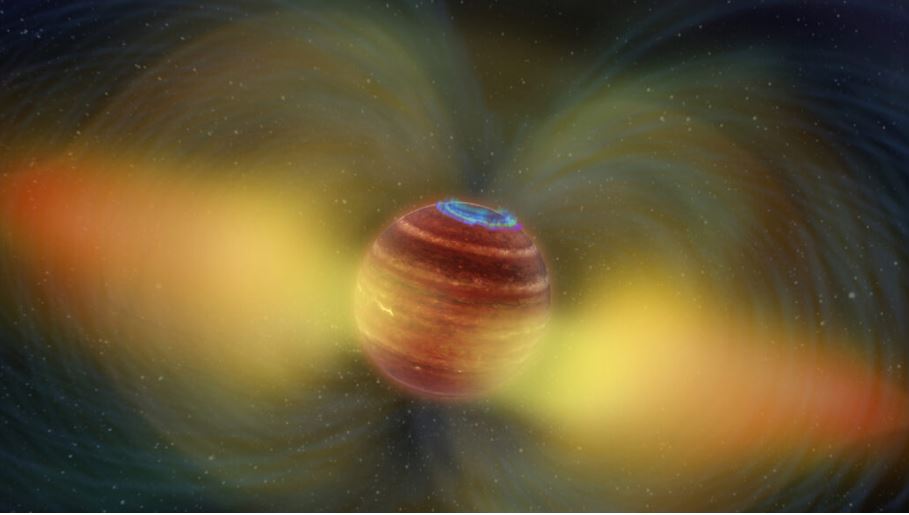


 3:41:48
3:41:48  2023-05-16
2023-05-16  896
896

For the first time, astronomers have spotted a band of radiation surrounding an object outside our solar system.
A belt of energetic electrons encircles a Jupiter-sized body about 18 lightyears from Earth, astronomers report May 15 in Nature. As the electrons move, they radiate radio waves. Such radiation belts give insight into the shape of a cosmic object’s magnetic field, its interior structure and maybe even whether it has moons.
In our solar system, every planet with a worldwide magnetic field has radiation belts. Earth has the Van Allen belts, rings of electrons captured from the sun . Jupiter’s radiation belts get most of their particles from the volcanic moon Io. In these cases, the planet’s magnetic field traps electrons in a bubble around the planet, like fireflies in a jar.
To find similar belts outside the solar system, astronomer Melodie Kao and colleagues observed a Jupiter-sized object called LSR J1835+3259 with a network of 39 radio dishes spanning from Hawaii to Germany. Together, the dishes effectively created a radio telescope about as wide as Earth, letting the team zero in on the object’s environment.
The team spotted a belt that looks a lot like those of Jupiter’s but 10 million times as bright, says Kao, of the University of California, Santa Cruz. The object is nearly 80 times as massive as Jupiter, making it either a diminutive star or a massive brown dwarf, a dim starlike body not hefty enough to sustain hydrogen fusion.
One big mystery is where the electrons come from. The object doesn’t orbit a star, and it doesn’t seem to emit flares. A volcanic satellite would fit the bill, Kao says, but that’s still speculative.
Knowing that LSR J1835+3259 has a radiation belt will help researchers interpret data from exoplanets in the future, even if astronomers can’t see such belts directly.
“Exoplanet magnetism is truly at its infancy,” Kao says. “Until we can characterize exoplanet magnetic fields, we’ll miss entire segments of their life stories.”
Reality Of Islam |
|

As AI-power

MXenes are

A newly dev

Get ready f
 9:3:43
9:3:43
 2018-11-05
2018-11-05
10 benefits of Marriage in Islam
 7:5:22
7:5:22
 2019-04-08
2019-04-08
benefits of reciting surat yunus, hud &
 9:45:7
9:45:7
 2018-12-24
2018-12-24
advantages & disadvantages of divorce
 11:35:12
11:35:12
 2018-06-10
2018-06-10
 6:0:51
6:0:51
 2018-10-16
2018-10-16
 10:47:11
10:47:11
 2022-11-22
2022-11-22
 6:14:17
6:14:17
 2018-06-21
2018-06-21
 6:28:21
6:28:21
 2022-12-20
2022-12-20
 4:26:43
4:26:43
 2022-02-21
2022-02-21
 12:10:56
12:10:56
 2022-11-17
2022-11-17
 3:43:50
3:43:50
 2022-11-05
2022-11-05
 9:42:16
9:42:16
 2022-10-19
2022-10-19
 5:41:46
5:41:46
 2023-03-18
2023-03-18
| LATEST |